In an era where AI-generated content is increasingly rampant and threatens to drown out the real human voice, the former news aggregation giant Digg is attempting a comeback with a fresh new look, aiming to reclaim the community spirit of early internet days. Founders Kevin Rose and Alexis Ohanian, who co-founded Reddit, are teaming up to transform Digg into a social platform for the AI age, where content creators and community moderators will reap more direct rewards from the platform's success.
Once a star of the Web2.0 era, Digg reached a valuation of $175 million in 2008. At the "Future of Everything" conference by The Wall Street Journal, the two founders detailed their vision to reshape Digg, focusing on reemphasizing content discovery and community building, returning to the purity of early internet days.
Ohanian looked back at the issues with content management in early social media platforms and admitted that he resigned from the board of Reddit due to dissatisfaction with its handling of hate speech, believing it was detrimental to both society and the company. He cited that Reddit allowed a controversial forum named "r/WatchPeopleDie" to exist for a long time until public attention was drawn after the Christchurch shooting incident forced them to adjust policies. After leaving Reddit, Ohanian founded the venture capital firm Seven Seven Six, focusing on building companies with greater "value alignment," and Digg represents a significant step in this direction for him.

Rose reflected on the limitations of early machine learning algorithms, pointing out that they often rewarded posts about the most obscure and eccentric topics, and expressed concerns that AI and robots were exacerbating this issue, pushing some "very strange agendas."
The two founders emphasized that they aim to build a community focused on serving real human users, rather than AI or robots. Ohanian openly declared himself a staunch believer in the "internet death theory," arguing that the web is inundated with content not created by humans but mass-produced by bots or humans using AI for manipulation and dissemination. He warned that ordinary people may not realize how much of such content they consume on social media.
To counter the rise of bots, Digg is exploring new technologies like zero-knowledge proofs (zk proofs) to verify user identities. They envision introducing a "human verification dial" in community management, allowing administrators to adjust verification levels as needed to ensure real humans are participating in conversations. Rose predicted that future internet will be filled with AI-generated content, and if users interact with AI disguised as humans on a platform intended for authentic social engagement, it would be a poor experience. Ohanian added that platforms can assess the credibility of a user’s identity through various means, such as analyzing device usage patterns. Rose also mentioned that Digg will offer different service tiers based on the likelihood of a user being human; for example, users employing disposable email addresses and VPNs might face functional restrictions or require additional identity verification, potentially even paying a small fee.

However, the two founders emphasized that they are not against AI but hope to leverage it to assist with website management, such as content moderation and dispute resolution.
Beyond identity verification, another major highlight of Digg lies in economic incentives for community moderators and content creators. Rose believes that the long-standing model of volunteers managing large communities without compensation must change, as these individuals invest substantial time and effort into their communities and deserve some form of compensation. He criticized platforms like Reddit for registering community names as trademarks, arguing that platforms should help these value-creating contributors instead of trying to claim ownership.
The two founders believe that by combining improved user experiences with empowering creators to monetize their work, Digg itself will benefit. Ohanian expressed confidence in Digg’s business model, believing it can harmonize the needs of all stakeholders to achieve mutual benefits.
